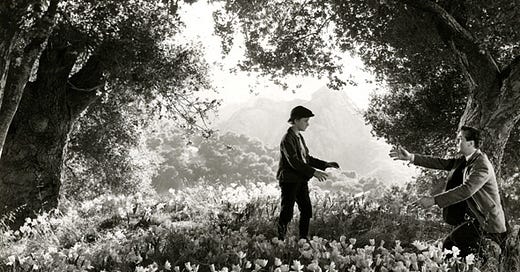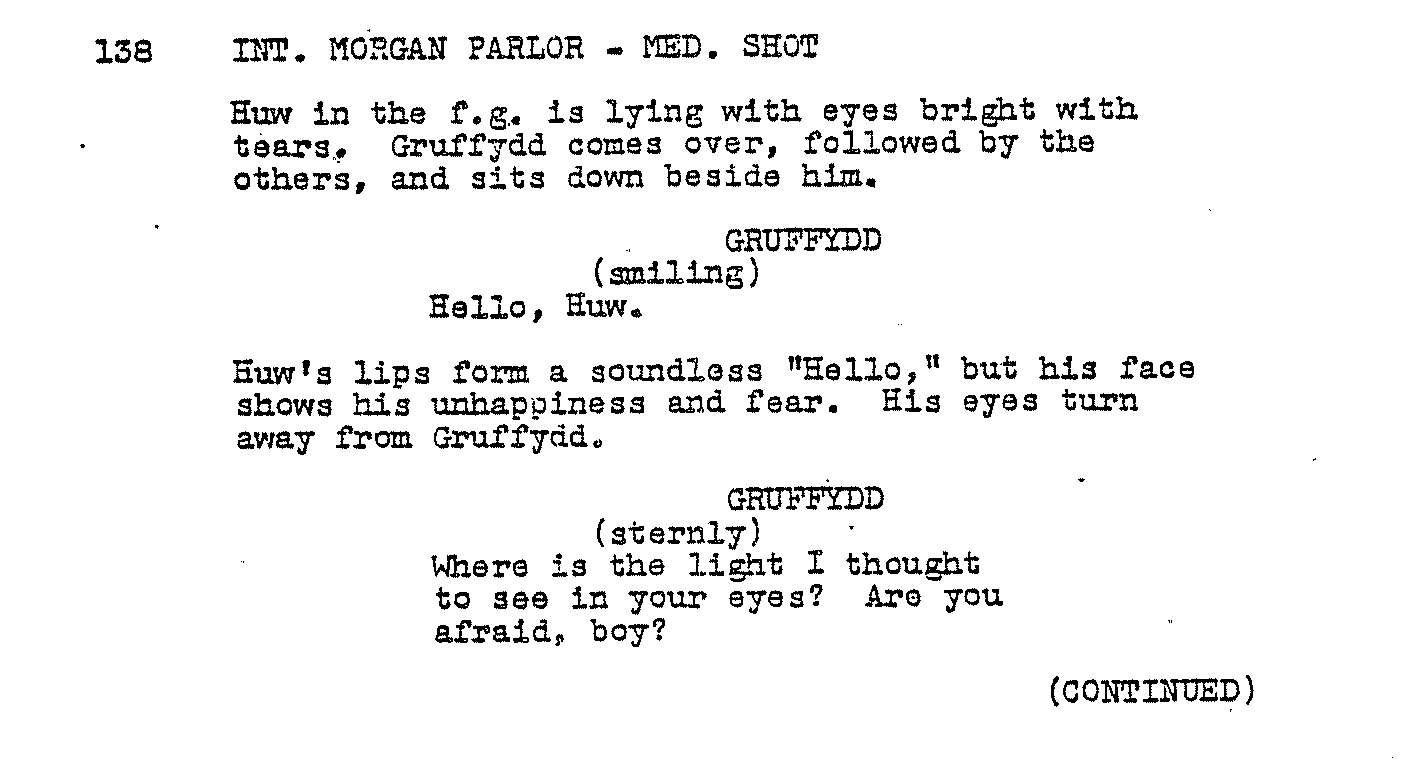100 Movies Every Catholic Should See #101: How Green Was My Valley (1941)
Directed by John Ford. Starring Walter Pidgeon and Maureen O'Hara
This was the film that beat out Citizen Kane for Best Picture.
And, I must say, I think it is the better film.
This is not necessarily a knock against Citizen Kane, which is an excellent tragedy, but I am more interested in the moral insights of Mr. John Ford than those of Mr. Welles. The two films do have interesting parallels: Kane is the tale of a man whose childhood was stripped away from him: How Green Was My Valley could also be viewed from that lens, but I think what the story has to say on family, poverty, and the loss of an agro-centric Europe are far more intriguing, especially when it’s coming from a Catholic like Ford. (It is all the more ironic that Welles has been quoted as saying that his only teachers in cinema were none other than “John Ford, John Ford, and John Ford”).
How Green Was My Valley is the tale of a Welsh mining family- the Morgans- in the late 19th century. All but one of the six sons in the family- Ianto, Ivor, Davy, Gwilym Jr., and Owen- work in the mines with their father, Gwilym Sr. (Donald Crisp, who won an Oscar for the role). The two youngest are daughter Angharad (Maureen O’Hara) and the youngest son, Huw (Roddy McDowall), the latter of whom presides as the protagonist of the film’s events, with Irving Pichel providing voiceover as adult Huw.
Huw, being the baby of the family, grows up in a household where he is fully cared for and mostly shielded from the hardships the older men in the family have to deal with in regard to the work at the mines. John Ford, despite having been born in America to Irish immigrants, still related with the story as the youngest in a large family.1 One of the film’s first scenes is the wedding of the fair lady Bronwen (Anna Lee) to Ivor (Patric Knowles), and they are married by the town’s new preacher, Mr. Merddyn Gruffydd (Walter Pidgeon), whom Angharad is very soon smitten with. Mr. Gruffydd is a man wholly devoted to his calling, and despite becoming a close friend of the family and showing some mutual interest for their daughter, he has his own reasons for not readily accepting Angharad’s advances.
Gruffydd does however become close with Huw, especially after the young boy falls into the freezing river along with his mother, Beth (Sara Allgood), and both are forced to recover in bed for months. Their relationship only strengthens in the first of many formative exchanges they are to share: here is an excerpt from the original shooting script of Gruffydd approaching the sullen Huw, who is newly bedridden.
This scene is paid off later in an incredibly moving scene (pictured at the top) where Gruffydd instructs Huw to walk to him on the hillside. The scene also sets up the beginning of the boy’s education, when shortly after the script page above Huw receives a copy of “Treasure Island” from the preacher, which begins a love of reading and learning in the boy which eventually leads his family to send him to a nearby national school, which requires him to walk to a village on the other side of the mountain. Huw’s education is one of the things that sets him apart from his older, working-class brothers, who feel increasingly cheated by the system and begin to move elsewhere in hopes of making better wages (unlike their father, who when their wages are cut from the powers-that-be, continues to hold the belief that better wages will come: “A good worker is worth good wages, and he will get them”).
This divide between Huw and his brothers results in the boy having to make a choice in which of his mentors to trust in when it comes to his future: after receiving his education, his father is adamant that he go off to become a doctor or lawyer, while the example of his brothers toiling in the mines (one of whom tragically meets his end there) is an admirable one and would keep him closer to his family despite the fact that there are beginning to be less and less Morgans still residing in the town.
When Huw eventually decides to work in the mines alongside his family, he is making his first real choice as a man. It is a choice built on faith: the same faith that told him he would indeed walk again. This same faith is one his brothers have gradually lost, as they move on to America and then all over the world in search of a better life. This loss of faith is cemented by a rant from Ianto (John Loder) against the clergy, however respectfully conveyed to Gruffydd:
IANTO: "[You] make yourselves out to be shepherds of the flock and yet allow your sheep to live in filth and poverty, and if they try to raise their voices against it, you calm them by saying their suffering is the Will of God.”
To which Gruffydd later replies (speaking of the union the brothers made):
“Alone you are weak. Together you are strong. But remember that with strength goes responsibility- to others and yourselves. For you cannot conquer injustice with more injustice- only with justice and with the help of God”
Huw, having firsthand experienced the effects of faith, chooses to stay by his mother and father despite the latter parent’s wishes, and is all the more a true man for it. In the heartrending final scene (which I will not spoil), it is clear that there was a reason for Huw to stay behind, to be with his family until the very end. Instead of searching for better opportunities elsewhere, Huw stayed in his hometown, trusting in God that this was where he needed to be.
As the gorgeous, tear-inducing final montage (scored by the legendary Alfred Newman) conveys: the good times, the simpler times of the film’s early scenes have come and gone, but now it is time for Huw to truly step up and lead his family and to be a man just like Mr. Gruffydd, even when it means sacrificing certain goods for the sake of duty to one’s people. The good times will indeed come again.
As adult Huw narrates in the film's last lines:
Men like my father cannot die. They are with me still - real in memory as they were in flesh, loving and beloved forever. How green was my Valley then.
Ford technically had a younger brother Daniel who died soon after being born








I have tears in my eyes just reading this! I saw it years ago as a kid and don't remember much of it at all. I have to rewatch!
I have to see this again. I read the heartrending book as a teen, before I ever got to see the movie. Don't recall too many details anymore, but it isn't really a Catholic film, is it, being set in Wales?